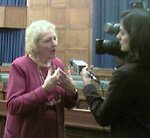 On May 4, local, state, and federal officials provided testimony on H.R. 4126, the “Chesapeake Bay Restoration and Enhancement Act”, telling Congress that there is no way to clean up the Chesapeake Bay by 2010 as called for by the Chesapeake 2000 Agreement that was signed six years ago by the region’s governors, state legislatures, and the EPA.
On May 4, local, state, and federal officials provided testimony on H.R. 4126, the “Chesapeake Bay Restoration and Enhancement Act”, telling Congress that there is no way to clean up the Chesapeake Bay by 2010 as called for by the Chesapeake 2000 Agreement that was signed six years ago by the region’s governors, state legislatures, and the EPA.
Fairfax County Supervisor Penny Gross, who chairs the Chesapeake Bay Program’s Local Government Advisory Committee, joined a panel of witnesses that also included representatives from the Environmental Protection Agency, the Chesapeake Bay Executive Council, the Chesapeake Bay Commission, and the Chesapeake Bay Foundation. Also providing testimony were Congressman Ben Cardin (MD) and Congresswoman Jo Ann Davis (VA).
In response to the release of a Government Accountability Office report on the Bay Program, Representative Wayne Gilchrest of Maryland and 16 bipartisan co-sponsors introduced H.R. 4126, the “Chesapeake Bay Restoration Enhancement Act of 2005.” The bill calls for reauthorizing the Chesapeake Bay Program through 2011 at an increased funding level of $50 million and includes measures to improve accountability for achieving Bay Program water quality goals. The bill would also increase the role of local governments in Bay restoration by increasing financial support for local projects, broadening representation of local governments in the Bay Program, and placing greater emphasis on efforts to improve local water quality.
Witnesses at Thursday’s hearing were all generally supportive of Congressman Gilchrest’s bill and the need to reinvigorate the entire Chesapeake Bay restoration effort. A study completed by a task force headed by former Virginia Gov. Gerald L. Baliles concluded that completing the cleanup would require a $15 billion investment by the federal government and affected states, and officials acknowledged that the money is nowhere in sight. Supervisor Gross, who also served as a member of the funding task force, emphasized the need to do more with limited funding and said the challenge was to use federal, state, and local dollars to target programs that yield "the best splash for the cash."
For more information on Thursday’s hearing and H.R. 4126, the “Chesapeake Bay Restoration and Enhancement Act,” click here.